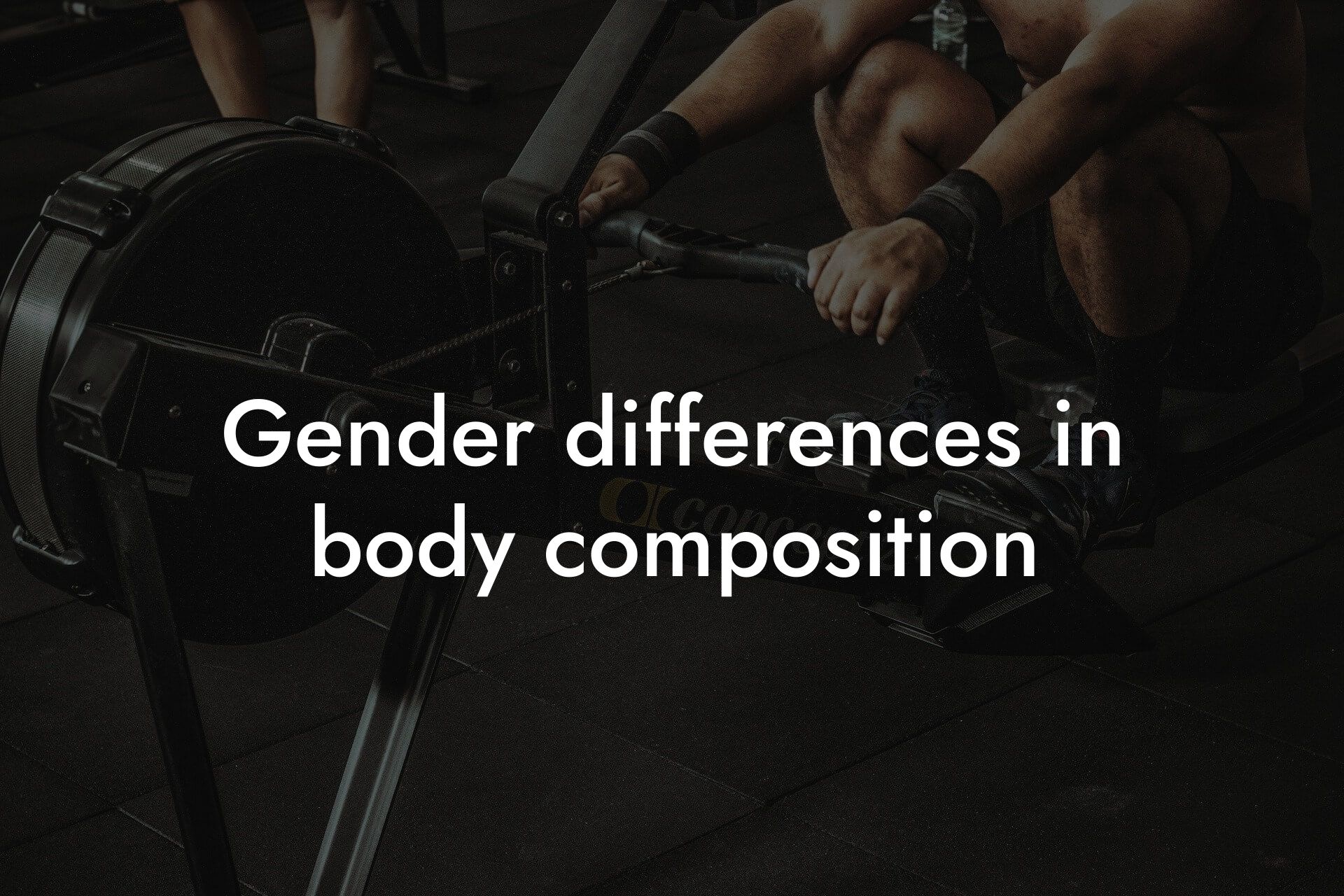As a high-earning professional, you understand the importance of maintaining a healthy and fit physique. One crucial aspect of achieving this goal is understanding how your body composition affects your metabolic rate. In this article, we'll delve into the relationship between body composition and metabolic rate, and provide you with the knowledge you need to optimize your physique and take your business to the next level.
Table of Contents
- What is Body Composition?
- What is Metabolic Rate?
- The Relationship Between Body Composition and Metabolic Rate
- The Impact of Body Fat on Metabolic Rate
- The Role of Muscle Mass in Metabolic Rate
- The Importance of Bone Density in Metabolic Rate
- How to Optimize Your Body Composition for a Faster Metabolic Rate
- Frequently Asked Questions
What is Body Composition?
Body composition refers to the percentage of fat and lean mass in your body. It's a critical aspect of overall health and fitness, as it affects your metabolic rate, energy levels, and overall well-being. Body composition is typically measured using a DEXA scan, which provides a detailed breakdown of your body fat percentage, lean mass, and bone density.
What is Metabolic Rate?
Metabolic rate, also known as metabolism, is the rate at which your body burns calories to sustain life. It's the process by which your body converts food into energy, and it's influenced by a combination of genetic, hormonal, and lifestyle factors. A fast metabolism means your body burns calories quickly, while a slow metabolism means it burns calories slowly.
The Relationship Between Body Composition and Metabolic Rate
Research has consistently shown that body composition plays a significant role in determining metabolic rate. In general, individuals with a higher percentage of lean mass tend to have a faster metabolic rate, while those with a higher percentage of body fat tend to have a slower metabolic rate. This is because lean mass, such as muscle, requires more energy to maintain than body fat.
A study published in the Journal of Clinical Endocrinology and Metabolism found that for every 10% increase in lean mass, resting metabolic rate (RMR) increased by 7%. This means that if you have a higher percentage of lean mass, your body will burn more calories at rest, even when you're not actively exercising.
The Impact of Body Fat on Metabolic Rate
Excess body fat, particularly visceral fat, can slow down your metabolic rate. Visceral fat, which accumulates around your organs, is particularly detrimental to metabolic health. It releases pro-inflammatory cytokines, which can disrupt insulin signaling and slow down your metabolism.
In addition, excess body fat can lead to insulin resistance, a precursor to type 2 diabetes. When you have insulin resistance, your body becomes less responsive to insulin, leading to high blood sugar levels and a slower metabolic rate.
The Role of Muscle Mass in Metabolic Rate
Muscle mass, on the other hand, plays a crucial role in maintaining a fast metabolic rate. Muscle tissue requires more energy to maintain than fat tissue, so the more muscle mass you have, the higher your resting metabolic rate will be.
A study published in the Journal of Applied Physiology found that resistance training, which builds muscle mass, increased RMR by 15% in older adults. This means that even when you're not actively exercising, your body will burn more calories if you have more muscle mass.
The Importance of Bone Density in Metabolic Rate
Bone density, which is often overlooked in discussions of body composition, also plays a role in metabolic rate. Research has shown that individuals with higher bone density tend to have a faster metabolic rate.
This is because bone density is closely linked to muscle mass. When you have strong bones, you're more likely to have strong muscles, which in turn support a faster metabolic rate.
How to Optimize Your Body Composition for a Faster Metabolic Rate
Now that you understand the relationship between body composition and metabolic rate, it's time to take action. Here are some tips to help you optimize your body composition for a faster metabolic rate:
1. Engage in regular resistance training to build muscle mass. Focus on compound exercises like squats, deadlifts, and bench press.
2. Incorporate high-intensity interval training (HIIT) into your workout routine. HIIT has been shown to improve insulin sensitivity and boost metabolic rate.
3. Eat a balanced diet that's high in protein and fiber. Aim to consume 1.6-2.2 grams of protein per kilogram of body weight daily.
4. Get enough sleep. Poor sleep quality and duration can disrupt hormones that regulate metabolism, leading to a slower metabolic rate.
5. Manage stress levels. Chronic stress can lead to increased cortisol levels, which can slow down your metabolic rate.
In conclusion, body composition plays a critical role in determining metabolic rate. By understanding the relationship between body composition and metabolic rate, you can take steps to optimize your physique and boost your metabolism. Remember, a higher percentage of lean mass, particularly muscle mass, is associated with a faster metabolic rate. By incorporating resistance training, HIIT, and a balanced diet into your lifestyle, you can achieve a faster metabolic rate and take your business to the next level.
At Tano Performance Group, we're committed to helping high-earning professionals like you achieve their fitness goals. Our state-of-the-art DEXA scan technology provides a detailed breakdown of your body composition, giving you the information you need to optimize your physique and boost your metabolism. Contact us today to learn more about our services and take the first step towards achieving your fitness goals.
Frequently Asked Questions
What is body composition, and how does it affect my metabolic rate?
Body composition refers to the proportion of fat and lean mass in your body. It plays a significant role in determining your metabolic rate, as the more lean mass you have, the higher your resting metabolic rate (RMR) will be. This is because lean mass, such as muscle, requires more energy to maintain than fat mass. As a result, individuals with a higher percentage of lean mass tend to burn more calories at rest, which can help with weight loss and weight management.
What is the ideal body composition for optimal metabolic rate?
The ideal body composition for optimal metabolic rate varies depending on factors such as age, gender, and fitness level. However, a general guideline is to aim for a body fat percentage between 10-15% for men and 15-20% for women. This range allows for a healthy balance between lean mass and fat mass, which can support a higher metabolic rate.
How can I measure my body composition?
There are several ways to measure body composition, including dual-energy X-ray absorptiometry (DXA), hydrostatic weighing, and skinfold measurements. At Tano Performance Group, we recommend using a DXA scan, which provides a highly accurate measurement of body fat percentage, lean mass, and bone density.
What is the difference between lean mass and fat mass?
Lean mass refers to the weight of your muscles, bones, and other non-fat tissues. It is the metabolically active tissue that requires energy to function and maintain. Fat mass, on the other hand, is the weight of your body fat, which serves as an energy reserve. While some body fat is essential for overall health, excess fat can negatively impact metabolic rate and overall health.
How does muscle mass impact metabolic rate?
Muscle mass has a significant impact on metabolic rate, as it is the primary determinant of resting metabolic rate (RMR). The more muscle mass you have, the higher your RMR will be, which can help you burn more calories at rest. This is why resistance training and building muscle mass is an effective way to boost metabolic rate and support weight loss.
Can I increase my metabolic rate without exercising?
While exercise, particularly resistance training, is an effective way to increase metabolic rate, there are other ways to boost your metabolism without exercising. These include getting enough sleep, eating a protein-rich diet, and incorporating metabolism-boosting foods such as green tea and cayenne pepper into your diet.
How does body fat percentage affect metabolic rate?
Body fat percentage has a significant impact on metabolic rate, as excess body fat can slow down metabolism. This is because fat tissue is less metabolically active than lean tissue, requiring less energy to maintain. As a result, individuals with a higher body fat percentage tend to have a slower metabolic rate, which can make it more challenging to lose weight and maintain weight loss.
What is the relationship between visceral fat and metabolic rate?
Visceral fat, also known as belly fat, is a type of fat that accumulates around the abdominal organs. It is particularly detrimental to metabolic rate, as it can lead to insulin resistance and metabolic syndrome. Reducing visceral fat through a combination of diet and exercise can help improve metabolic rate and overall health.
How does age affect body composition and metabolic rate?
Age has a significant impact on body composition and metabolic rate, as we naturally lose lean mass and gain fat mass as we age. This can lead to a slower metabolic rate, making it more challenging to maintain weight loss. However, incorporating resistance training and a healthy diet into your lifestyle can help mitigate the effects of aging on body composition and metabolic rate.
What is the impact of hormones on body composition and metabolic rate?
Hormones, such as testosterone and growth hormone, play a significant role in regulating body composition and metabolic rate. Imbalances or deficiencies in these hormones can lead to changes in body composition, such as increased fat mass and decreased lean mass, which can negatively impact metabolic rate.
How does sleep affect body composition and metabolic rate?
Sleep is essential for maintaining a healthy body composition and metabolic rate. During sleep, our bodies repair and rebuild muscle tissue, which can help support a higher metabolic rate. Additionally, sleep deprivation can lead to increased levels of the hunger hormone ghrelin and decreased levels of the fullness hormone leptin, making it more challenging to maintain a healthy weight.
What is the impact of stress on body composition and metabolic rate?
Chronic stress can have a negative impact on body composition and metabolic rate, as it can lead to increased levels of the hormone cortisol. Cortisol promotes the storage of fat, particularly in the abdominal region, which can negatively impact metabolic rate. Engaging in stress-reducing activities, such as yoga and meditation, can help mitigate the effects of stress on body composition and metabolic rate.
How does diet affect body composition and metabolic rate?
Diet plays a critical role in regulating body composition and metabolic rate. A diet high in protein and low in processed foods and added sugars can help support a healthy body composition and boost metabolic rate. Additionally, incorporating metabolism-boosting foods such as green tea and cayenne pepper into your diet can help support a higher metabolic rate.
What is the role of genetics in body composition and metabolic rate?
Genetics can play a role in body composition and metabolic rate, as certain genetic factors can influence our body's ability to burn fat and build muscle. However, while genetics can affect our body composition and metabolic rate, it is not the sole determining factor. A healthy diet and regular exercise can help overcome genetic predispositions and support a healthy body composition and metabolic rate.
Can I improve my body composition and metabolic rate through supplements?
While certain supplements, such as protein powder and creatine, can support muscle growth and boost metabolic rate, they should not be relied upon as the sole means of improving body composition and metabolic rate. A healthy diet and regular exercise should always be the primary focus, with supplements used to support and enhance your efforts.
How long does it take to see improvements in body composition and metabolic rate?
The time it takes to see improvements in body composition and metabolic rate varies depending on factors such as diet, exercise, and starting point. However, with a consistent and well-planned approach, you can start to see improvements in as little as 6-8 weeks. It's essential to be patient and focus on progress, not perfection.
What is the relationship between bone density and body composition?
Bone density is closely linked to body composition, as a higher percentage of lean mass can help support stronger bones. Additionally, resistance training, which is essential for building lean mass, can also help improve bone density. This is why it's essential to incorporate resistance training into your exercise routine, particularly as you age.
Can I improve my body composition and metabolic rate through cardio exercise alone?
While cardio exercise can help improve cardiovascular health and burn calories, it is not as effective for improving body composition and metabolic rate as resistance training. This is because cardio exercise does not build lean mass, which is essential for boosting metabolic rate. A combination of cardio and resistance training is ideal for improving body composition and metabolic rate.
How does body composition affect athletic performance?
Body composition has a significant impact on athletic performance, as a higher percentage of lean mass can improve power, speed, and endurance. Additionally, a lower body fat percentage can improve agility and overall athletic performance. This is why many athletes focus on building lean mass and reducing body fat percentage to improve their performance.
What is the impact of body composition on overall health?
Body composition has a significant impact on overall health, as excess body fat is linked to a range of chronic diseases, including heart disease, type 2 diabetes, and certain types of cancer. Maintaining a healthy body composition through a combination of diet and exercise can help reduce the risk of these diseases and improve overall health.
How can I maintain my body composition and metabolic rate over time?
Maintaining body composition and metabolic rate over time requires a consistent and well-planned approach. This includes incorporating resistance training and cardio exercise into your routine, eating a healthy and balanced diet, and getting enough sleep. Additionally, regular monitoring of body composition and metabolic rate can help identify any changes and make adjustments as needed.
What are the benefits of working with a professional to improve body composition and metabolic rate?
Working with a professional, such as a registered dietitian or certified personal trainer, can provide personalized guidance and support to help you achieve your body composition and metabolic rate goals. They can help you develop a tailored plan that takes into account your unique needs and goals, providing a more effective and efficient approach to improving body composition and metabolic rate.
How can I get started with improving my body composition and metabolic rate?
Getting started with improving your body composition and metabolic rate is as simple as taking the first step. This can include scheduling a consultation with a registered dietitian or certified personal trainer, starting a new exercise routine, or making small changes to your diet. Remember, small changes can add up over time, and consistency is key to achieving your goals.
Here are some related articles you might love...
- The role of brown fat in body composition
- How body composition changes with endurance training
- Gender differences in body composition
- Understanding bone marrow density in DEXA scans
- How DEXA scans detect visceral fat
- Advanced body composition metrics: Lean mass index
- The impact of muscle asymmetry on body performance
- Differences between subcutaneous and visceral fat
- How hydration levels affect body composition results
Zak Faulkner
Zak Faulkner is a leading authority in the realm of physical health and body composition analysis, with over 15 years of experience helping professionals optimise their fitness and well-being. As one the experts behind Tano Performance Group, Zak has dedicated his career to providing in-depth, science-backed insights that empower clients to elevate their physical performance and overall health.
With extensive knowledge of DEXA technology, Zak specializes in delivering comprehensive body assessments that offer precise data on body fat, muscle mass, bone density, and overall physique. His expertise enables individuals to make informed decisions and achieve their fitness goals with accuracy and confidence. Zak’s approach is rooted in a deep understanding of human physiology, combined with a passion for helping clients unlock their full potential through personalised strategies.
Over the years, Zak has earned a reputation for his commitment to excellence, precision, and client-focused service. His guidance is trusted by top professionals who demand the best when it comes to their health. Whether advising on fitness programs, nutritional strategies, or long-term wellness plans, Zak Faulkner’s insights are a valuable resource for anyone serious about taking their health and fitness to the next level.
At Tano Performance Group, Zak continues to lead our Content Team revolutionising how professionals approach their physical health, offering unparalleled expertise that drives real results.




